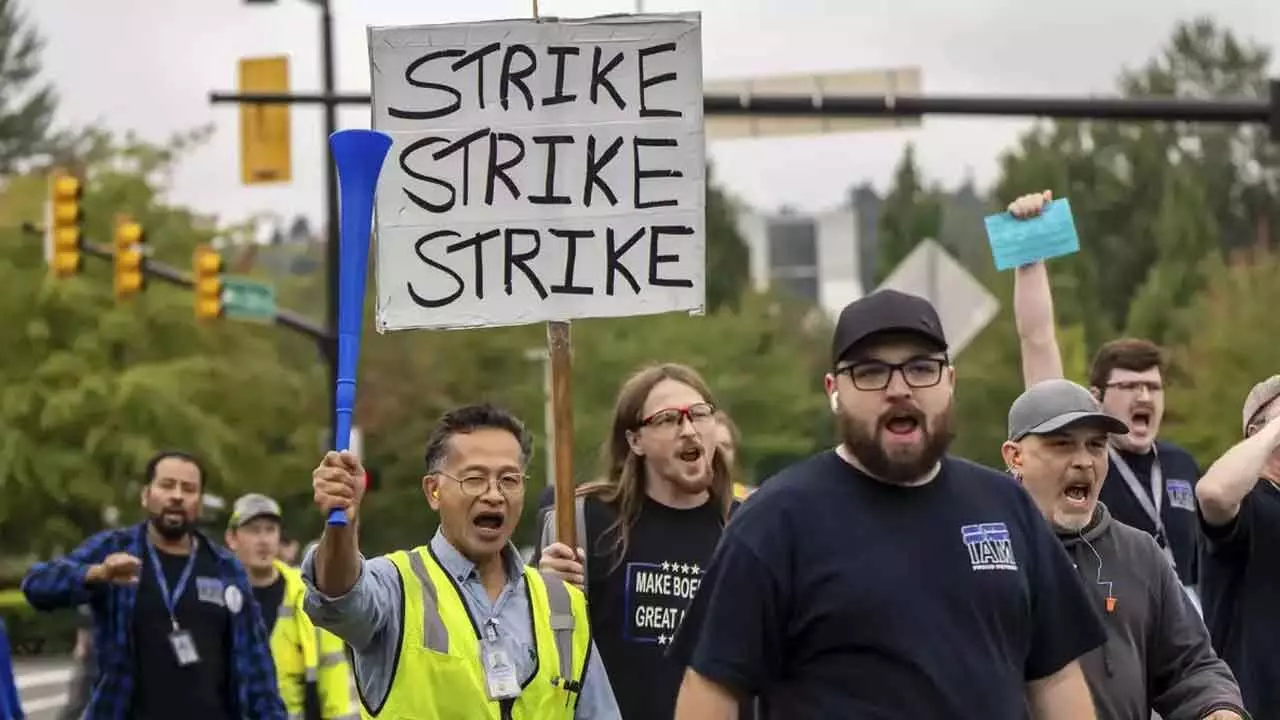Boeing Faces Another Setback As Machinists Vote To Strike
Despite Boeing's offer of a 25% pay raise over four years, workers felt it was insufficient to compensate for past sacrifices
Boeing Faces Another Setback As Machinists Vote To Strike

Machinists at Boeing voted to go on strike, another setback for the giant aircraft maker whose reputation and finances have been battered and now faces a shutdown in production of its best-selling airline planes.
The International Association of Machinists and Aerospace Workers said 94.6 per cent of voting workers rejected the contract, which would have raised pay 25 per cent over four years, and 96 per cent approved the strike - easily surpassing a two-thirds requirement.
“This is about respect, this is about the past, and this is about fighting for our future," IAM District 751 President Jon Holden said in announcing the vote. Boeing did not immediately comment on the vote. Very little has gone right for Boeing this year, from a panel blowing out and leaving a gaping hole in one of its passenger jets in January to NASA leaving two astronauts in space rather sending them home on a problem-plagued Boeing spacecraft.
As long as the strike lasts, it will deprive Boeing of much-needed cash that it gets from delivering new planes to airlines. That will be another challenge for new CEO Kelly Ortberg, who six weeks ago was given the job of turning around a company that has lost more than $25 billion in the last six years and fallen behind European rival Airbus.
Ortberg made a last-ditch effort to salvage a deal that had unanimous backing from the union's negotiators. He told machinists Wednesday that “no one wins” in a walkout, and that a strike would put Boeing's recovery in jeopardy and raise more doubt about the company in the eyes of its airline customers. “For Boeing, it is no secret that our business is in a difficult period, in part due to our own mistakes in the past,” he said.
“Working together, I know that we can get back on track, but a strike would put our shared recovery in jeopardy, further eroding trust with our customers and hurting our ability to determine our future together.” Workers were in no mood to listen. Holden said Ortberg faced a difficult position because machinists are bitter about stagnant wages and concessions they have made since 2008 on pensions and health care to prevent the company from moving jobs elsewhere. “It's hard to make up for 16 years,” he said.
The vote was also a rebuke to Holden and union negotiators, who recommended that workers approve the contract offer. Holden, who predicted that workers would vote to strike, said the union will survey members to decide what issues they want to stress when negotiations resume. Union members posted complaints about the deal all week on social media, often demanding bigger raises. On Thursday, several dozen blew whistles, banged drums and held up signs calling for a strike as they marched to a union hall near Boeing's 737 Max plant in Renton, Washington. “As you can see, the solidarity is here,” said Chase Sparkman, a quality-assurance worker. “I'm expecting my union brothers and sisters to stand shoulder to shoulder, arm in arm, and let our company know that, hey, we deserve more.”
The machinists make $75,608 per year on average, not counting overtime, and that would rise to $106,350 at the end of the four-year contract, according to Boeing. However, the deal fell short of the union's initial demand for pay raises of 40 per cent over three years. The union also wanted to restore traditional pensions that were axed a decade ago but settled for an increase in Boeing contributions to employee's 401(k) retirement accounts. Boeing worker Adam Vogel called the 25 per cent raise “a load of crap. We haven't had a raise in 16 years.”
Broderick Conway, another quality-assurance worker and 16-year Boeing employee, said the company can afford more. “A lot of the members are pretty upset about our first offer. We're hoping that the second offer is what we're looking for,” he said. "If not ... we're going to keep striking and stand up for ourselves.” The head of Boeing's commercial-airplanes business, Stephanie Pope, tried this week to discourage the blue-collars workers from thinking that a strike would result in a better offer from the company. “We bargained in absolute good faith with the IAM team that represents you and your interests,” she said.

